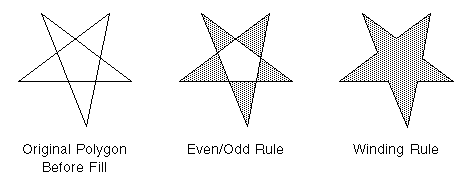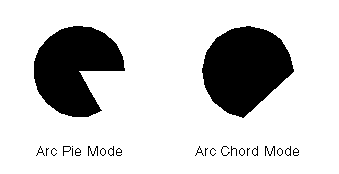The Resource Editor
Use the resource editor to edit the various graphic resources of selected objects.

The Resource Editor
The resource editor contains the following elements:
-
Palette Name This combo box displays the name of the current palette. It can be edited.
Click the arrow button of the combo box to display a list of named palettes. You can then choose one of these named palettes. When a named palette is selected, all its resources are displayed in the Resources editor.
-
Foreground The current foreground color is displayed in the box to the right of the palette name field. To change the foreground color, click the box and choose a new color from the color palette that appears.
-
Background The current background color is displayed in the box to the right of the palette name field. To change the background color, click the box and choose a new color from the color palette that appears.
-
Pattern The current fill pattern is shown in the box to the right of the background square. To change the fill pattern, click the box and choose a new pattern.
-
Pattern Color The current pattern color is shown in the box to the right of the Pattern box. To change the pattern color, click the box and choose a new color.
-
Fill Style The current fill style is displayed in the box to the right of the Pattern Color box. To change the fill style, click the fill style box and choose a new style.
-
Font The current font name is displayed in the combo box to the right of the line width. You can select a predefined font name in the combo box or click Choose... to select another font.
-
Line Style The current line style is shown by the horizontal line to the right of the fill pattern. To change the line style, click the line style box and choose a new style.
-
Line Width The current line width value is shown in this combo box to the right of the line style. You can choose a new line-width value from the drop-down list.
-
Fill Rule Mode The current fill rule mode is shown by the fill mode icon. This setting determines how a polygon is filled. Click the icon to change the fill mode.
-
Arc Mode The current Arc mode is shown by the arc mode icon. Click the icon to change the arc mode.
-
Alpha The current Alpha value is shown by a slider. The alpha value indicates the amount of transparency the drawing will be given. To change the alpha value, move the slider.
-
Antialiasing Mode The current antialiasing mode is shown by the oblique line to the right of the Alpha. The anti-aliasing mode indicates whether smooth lines are drawn using anti-aliasing. To change the antialiasing mode, click the oblique line.
The fill rule indicates which points are to be considered as inside a polygon that is to be filled, depending on the count of crossing segments that define the shape of the area to be filled.
Click the even/odd rule icon to select the even/odd rule for filling the area of a polygon. According to this rule, in the case of the complex polygon shown below, the central area of the star is not considered to lie inside the polygon, and therefore, is not filled. This is the default value.
Click the winding rule icon to select the winding rule for filling the area of a polygon. According to this rule, the central area of the star is considered to lie inside the polygon, and therefore, is filled.

-
Arc Mode The current arc mode is shown by the filled arc icon. This setting determines how an arc is closed. Click the icon to change the arc mode.
Click the arc pie mode icon to select the arc pie mode. When this mode is selected, the arc is closed by adding two lines, from the center of the complete circle to the start and end points of the arc. This is the default mode.
Click the arc chord mode icon to select the arc chord mode. When this mode is selected, the arc is closed by adding a line from the start point to the end point.
